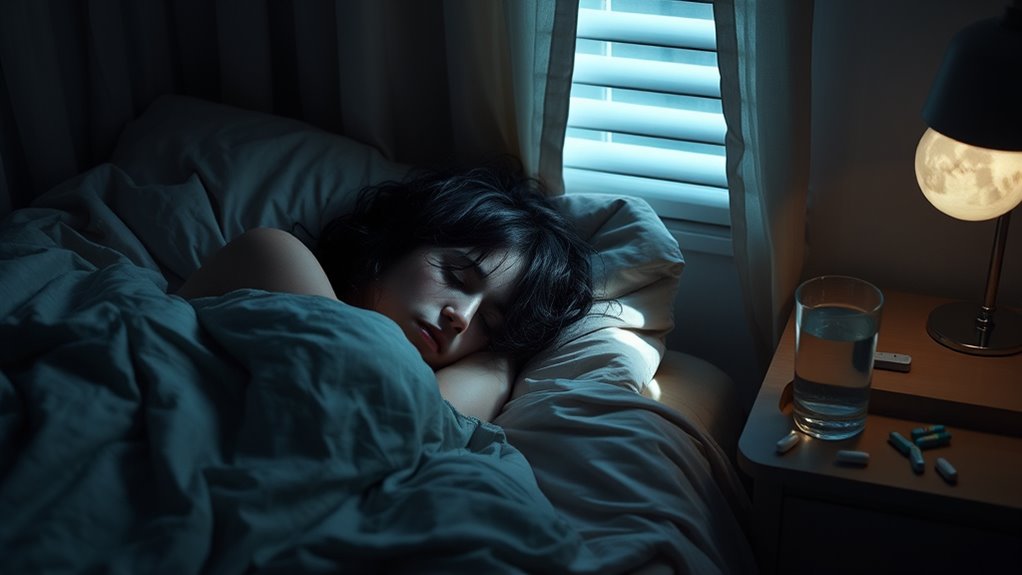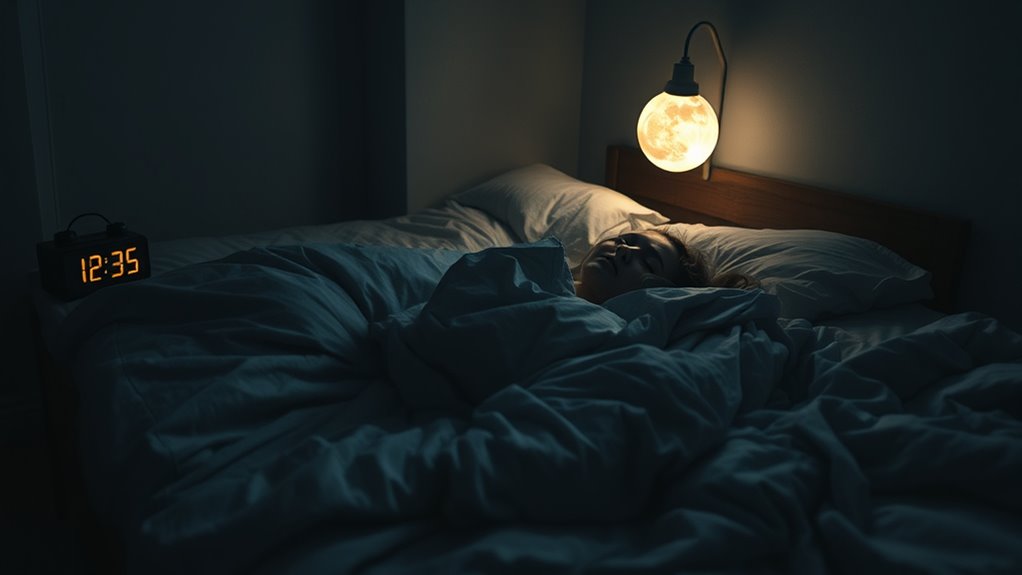If you have BPD, you might notice your sleep is often disrupted, with trouble falling asleep, frequent awakenings, and nightmares. These sleep issues can worsen emotional instability, impulsivity, and mood swings, creating a cycle that’s hard to break. Emotional dysregulation and trauma history contribute to hyperarousal and poor sleep quality. Addressing these sleep disturbances with tailored strategies can support your emotional health—continue to learn how these factors connect and how to manage them effectively.
Key Takeaways
- Sleep disturbances, including delayed onset and fragmentation, worsen emotional dysregulation and impulsivity in individuals with BPD.
- Disrupted REM sleep impacts emotional processing, memory, and mood stability in BPD.
- Emotional dysregulation and trauma history contribute to hyperarousal, nightmares, and sleep difficulties in BPD.
- Targeted interventions like CBT-I and trauma-informed care can improve sleep quality and emotional stability in BPD.
- Future research aims to develop personalized, biologically based treatments by exploring sleep biomarkers and circadian rhythms.
Understanding Borderline Personality Disorder and Its Core Features

Borderline Personality Disorder (BPD) is a mental health condition marked by significant emotional instability and impulsivity. You may experience intense mood swings and difficulty managing your emotions, which is a core feature of borderline personality disorder.
Emotional dysregulation can lead to rapid shifts in feelings, affecting your interpersonal relationships and sense of self. These mood instability and impulsivity often contribute to challenges in maintaining stable connections with others. Moreover, the contrast ratio of emotional responses can influence how effectively you recover from emotional episodes. Understanding the emotional regulation involved in managing these shifts can provide insight into coping mechanisms.
Emotional swings disrupt relationships and challenge your sense of identity.
BPD can also impact your sleep quality, with sleep disturbances frequently accompanying emotional symptoms. This combination makes it harder to regulate emotions and maintain consistent sleep patterns, creating a cycle that exacerbates emotional and physical health. Recognizing the importance of sleep hygiene can be beneficial in managing symptoms and improving overall well-being.
Understanding these core features helps you better understand how BPD influences both your emotional state and sleep. Data privacy concerns related to emotional regulation and sleep patterns highlight the importance of understanding the underlying mechanisms of BPD.
How Sleep Disturbances Manifest in BPD Patients

Many individuals with BPD experience noticeable disruptions in their sleep patterns, which often mirror their emotional challenges. These sleep disturbances include delayed sleep onset, fragmented sleep, and reduced sleep efficiency. You may notice trouble falling asleep, frequent awakenings, or nightmares that worsen emotional reactivity. Additionally, the impact of these disturbances on overall health can be compounded by disrupted REM sleep, which is vital for emotional processing and memory consolidation. Research indicates that disrupted sleep architecture can exacerbate emotional dysregulation, making management more challenging. Objective assessments show decreased total sleep time and altered REM sleep, further impacting overall sleep quality. Furthermore, poor sleep patterns can interfere with circular sleep-wake cycles, disrupting the body’s natural rhythms and intensifying emotional instability. You might also find that sleep efficiency is compromised, leading to less restful nights and increased daytime fatigue. The discrepancy between how you perceive your sleep and actual sleep data can heighten frustration and confusion. Emerging research suggests that improving sleep quality can significantly help in managing BPD symptoms and emotional regulation.
These issues often lead to:
- Increased emotional instability due to poor sleep quality
- Heightened BPD symptoms like impulsivity and mood swings
- Strained emotional regulation, making daily challenges harder to manage
The Impact of Emotional Dysregulation on Sleep Quality

When emotional dysregulation affects you at night, it can lead to heightened arousal that makes falling asleep difficult. Your nighttime rumination and rapid mood swings often keep your mind active, disrupting your sleep patterns. Addressing these emotional triggers through therapies like DBT can help improve your sleep quality. Incorporating AI-driven storytelling techniques may also support personalized mental health interventions to manage emotional dysregulation more effectively. Additionally, understanding potential pitfalls in adopting new payment technologies can inform strategies for integrating therapeutic tools securely and efficiently. Recognizing the importance of effective tools for dust removal can further support maintaining a calming environment conducive to restful sleep. Exploring the role of prophetic dreams can sometimes offer valuable insights into subconscious emotional states that influence sleep.
Emotional Arousal at Night
Emotional dysregulation at night markedly impacts sleep quality by increasing pre-sleep arousal levels. This heightened emotional arousal makes it harder to fall asleep and stay asleep, leading to longer sleep onset latency and frequent awakenings. Night-time hyperarousal, fueled by intense emotional episodes like nightmares and flashbacks, disrupts sleep continuity and reduces overall sleep quality. You may find yourself trapped in a cycle of emotional reactivity that worsens sleep disturbances, leaving you exhausted. Managing emotion regulation strategies can help calm this hyperarousal, improving your sleep. Both tests widely used in various settings, including counseling and organizational development. You might also benefit from understanding how personality traits influence emotional responses, offering tailored approaches to managing nighttime emotional intensity. Feeling overwhelmed by intense emotions just as you’re trying to rest, struggling with nightmares that leave you frightened and restless, experiencing persistent sleep disturbances due to emotional reactivity.
Nighttime Rumination Patterns
Nighttime rumination is a common pattern in BPD that considerably impacts sleep quality. When emotional dysregulation takes over, you might find yourself replaying distressing thoughts, which prolongs pre-sleep arousal and delays sleep onset. Increased emotional reactivity and unresolved conflicts heighten emotional distress during the night, fueling persistent rumination. This cycle makes it hard to calm your mind, leading to sleep disturbances like insomnia, nightmares, and fragmented sleep. The more emotionally dysregulated you feel, the more intense and frequent your nighttime rumination becomes, creating a feedback loop that worsens sleep quality. However, therapies like DBT can help manage emotional dysregulation, reducing nighttime rumination and improving your sleep. Recognizing this pattern is the first step toward better sleep health. Incorporating mindfulness techniques can also help ground your thoughts and reduce emotional reactivity before bedtime. Regular use of emotion regulation skills can further break this cycle and promote restful sleep, especially by addressing emotional dysregulation directly. Developing self-awareness about your emotional triggers can additionally support healthier sleep patterns. Utilizing AI-driven tools for tracking your emotional states might also provide insights into your nighttime patterns and triggers.
Mood Swings Disrupt Sleep
Mood swings driven by emotional dysregulation can markedly disrupt your sleep, making it hard to fall asleep or stay asleep throughout the night. When your emotions fluctuate wildly—especially with anger or anxiety—you experience increased sleep latency and fragmented sleep, leaving you exhausted. These intense mood swings often trigger nightmares or intrusive thoughts, further impairing your sleep quality and duration. The cycle worsens as poor sleep heightens emotional instability, fueling more mood swings and emotional dysregulation. You might find yourself:
- Tossing and turning due to pre-sleep arousal
- Waking frequently with racing thoughts or nightmares
- Feeling drained, unable to regain restful sleep
This ongoing cycle makes it difficult to break free from the impact of emotional instability on your sleep. Understanding anime movies can serve as a helpful distraction and relaxation technique to improve sleep quality. Engaging in calming activities can help regulate your vibrational state, promoting better sleep and emotional balance. Additionally, incorporating consistent sleep routines can help mitigate the effects of emotional fluctuations on your rest.
Common Sleep Problems Reported by Individuals With BPD

Individuals with BPD often experience a range of sleep problems that disrupt their rest, despite sometimes feeling their sleep is worse than it appears on tests. Common issues include sleep disturbances like insomnia, nightmares, and difficulty maintaining sleep. These problems can increase sleep onset latency, making it harder to fall asleep, and lead to fragmented sleep.
Objective measures, such as polysomnography, reveal reduced sleep efficiency and altered REM sleep patterns, highlighting differences between perceived and actual sleep quality. Many individuals report frequent night awakenings and poor sleep overall.
These disturbances are often linked to heightened emotional arousal and trauma history, which contribute to nightmares and restless nights. Despite feeling unrested, sleep studies sometimes show better sleep than what you subjectively experience.
The Link Between Sleep Disruptions and Symptom Severity

Research shows that sleep disruptions are closely linked to the severity of BPD symptoms, with poorer sleep often indicating worse emotional and behavioral challenges. When your sleep quality declines, you may notice increased emotional dysregulation and impulsivity.
Poor sleep quality signals worsening BPD symptoms and increased emotional challenges.
Objective measures reveal that higher symptom severity correlates with delayed circadian rhythms and diminished rhythm amplitude. Additionally, REM abnormalities like shorter REM latency and increased density are more common as symptoms worsen.
These disruptions can feel overwhelming, making emotional control harder.
- Struggling with irregular sleep patterns can intensify emotional instability.
- Nightmares and fragmented sleep often reflect deeper symptom severity.
- Disrupted circadian rhythms serve as objective markers of your emotional state.
Understanding this link highlights how vital good sleep is for managing BPD’s intensity and overall well-being.
Factors Contributing to Sleep Issues in BPD

Your emotional dysregulation can make it hard to fall asleep or stay asleep, often leading to fragmented rest.
Trauma and anxiety histories further heighten sleep issues, causing nightmares and hypervigilance.
These factors create a cycle that worsens sleep quality and impacts your overall well-being.
Emotional Dysregulation Impact
Emotional dysregulation in BPD directly contributes to sleep difficulties by causing heightened pre-sleep arousal and persistent intense emotions. This emotional turmoil keeps your mind racing and your body physiologically activated, leading to sleep disturbances like insomnia.
When emotions shift rapidly and remain unresolved, they interfere with your ability to progress smoothly into sleep, reducing sleep quality. You may experience:
- Overwhelming feelings that keep you awake at night
- Elevated heart rate and cortisol levels disrupting rest
- Difficulty calming your mind from emotional chaos
These effects increase pre-sleep arousal, making it harder to fall asleep and stay asleep. Affective instability and physiological activation create a vicious cycle, worsening sleep problems and impairing overall well-being.
Trauma and Anxiety Effects
Trauma and anxiety considerably contribute to sleep issues in individuals with BPD by fueling physiological and emotional hyperarousal. Trauma, especially childhood maltreatment and sexual abuse, often leads to sleep disturbances like nightmares, insomnia, and flashbacks that disrupt sleep architecture.
Anxiety symptoms, including excessive worry and hyperarousal, make it difficult to fall asleep and cause frequent nighttime awakenings. Neurobiological changes, such as heightened amygdala activity, worsen sleep regulation problems.
These trauma- and anxiety-related symptoms intensify sleep disturbances, which in turn worsen emotional dysregulation in BPD. The cycle of hyperarousal and disrupted sleep perpetuates emotional instability, making it harder to achieve restful sleep and maintain emotional balance.
Addressing trauma and anxiety is vital for improving sleep in BPD.
Strategies for Managing Sleep Problems in BPD

Managing sleep problems in BPD involves a combination of behavioral strategies and therapeutic techniques aimed at stabilizing sleep patterns and reducing pre-sleep arousal. You can improve your sleep by establishing consistent sleep hygiene routines, such as creating a restful environment, avoiding stimulants, and limiting screen time.
Using sleep diaries helps track your sleep patterns and identifies issues related to emotional dysregulation. Incorporate relaxation techniques, like deep breathing or mindfulness, to ease pre-sleep arousal caused by trauma or intense emotions.
Behavioral interventions, such as adjusting bedtime based on individual sleep needs, can help regulate circadian rhythms. Remember, involving yourself in sleep management fosters empowerment and adherence, making it easier to overcome sleep disturbances.
- Feel more in control of your nights and days
- Reduce nightmares and insomnia
- Regain stability through consistent routines
The Role of Sleep in Emotional Regulation and Overall Well-being

Sleep plays a crucial role in regulating your emotions and maintaining overall well-being. When you experience sleep disturbances like insomnia, nightmares, or altered REM patterns, your emotional regulation suffers, especially if you have BPD.
Poor sleep quality increases emotional reactivity, impulsivity, and makes it harder to manage negative feelings, worsening BPD symptoms. Disrupted sleep architecture and circadian rhythms can lead to greater mood instability and behavioral issues.
Addressing these issues through consistent routines and targeted interventions helps improve sleep quality. Restoring healthy sleep patterns supports emotional stability, reducing the severity of BPD symptoms.
Ultimately, good sleep isn’t just about rest—it’s essential for your emotional health and overall well-being.
Future Directions for Research and Treatment Approaches

To advance treatment and understanding of sleep issues in BPD, future research should prioritize large-scale, controlled studies that combine subjective reports with objective measures like polysomnography and actigraphy. This approach will help you better understand sleep disturbances and their impact on emotion regulation.
Investigating the causal links between sleep disruptions and emotional dysregulation can lead to targeted interventions, such as sleep-specific behavioral therapy like modified CBT-I.
Incorporating trauma-informed sleep treatments may address childhood maltreatment’s role in BPD severity.
Exploring neurobiological biomarkers related to circadian rhythms can personalize treatment and improve outcomes.
- Find hope in innovative, evidence-based approaches
- Overcome barriers that hinder emotional stability
- Embrace healing through tailored, trauma-informed care
Frequently Asked Questions
Does BPD Affect Your Sleep?
Yes, BPD can affect your sleep. You might find it hard to fall asleep, wake up frequently, or have nightmares. These sleep issues can make you feel more emotionally reactive and less able to manage stress.
You may notice that your sleep feels poor, even if objective measures don’t show major problems. Addressing sleep difficulties is vital because they can worsen BPD symptoms and impact your overall well-being.
What Triggers BPD Splitting?
Splitting in BPD happens when you perceive someone’s actions as all good or all bad, often triggered by feelings of rejection or betrayal. Stressful events or conflicts can overwhelm your emotional regulation, leading to these black-and-white thinking patterns.
When you’re tired or sleep-deprived, your judgment worsens, making it harder to manage intense emotions. Recognizing these triggers helps you anticipate and cope better with splitting episodes.
How to Calm Down BPD Rage?
You might think calming BPD rage is impossible, but it’s entirely doable. First, take deep breaths or practice progressive muscle relaxation to reduce arousal.
Use grounding techniques, like focusing on your senses, to bring your mind back to the present.
Engaging in mindfulness before bed can also help you relax.
These strategies lower your emotional intensity and help you regain control during intense anger episodes.
What Are the 3 C’s of BPD?
The 3 C’s of BPD are Crisis, Chaos, and Confusion. You experience frequent crises, intense emotional chaos, and struggle with identity and relationship confusion.
Recognizing these patterns helps you understand your impulsivity and instability. Knowing about the 3 C’s also guides your treatment, emphasizing the importance of establishing stability and practicing emotional regulation.
Being aware of these core patterns can support your journey toward managing BPD symptoms more effectively.
Conclusion
By understanding the tangled relationship between sleep and BPD, you open the key to better emotional health. Sleep isn’t just rest—it’s the bridge that can lead you to calmer days and clearer nights. When you prioritize your sleep, you’re planting the seeds for resilience and balance. So, don’t underestimate the power of a good night’s sleep—it’s your secret weapon in the journey toward healing and harmony.









